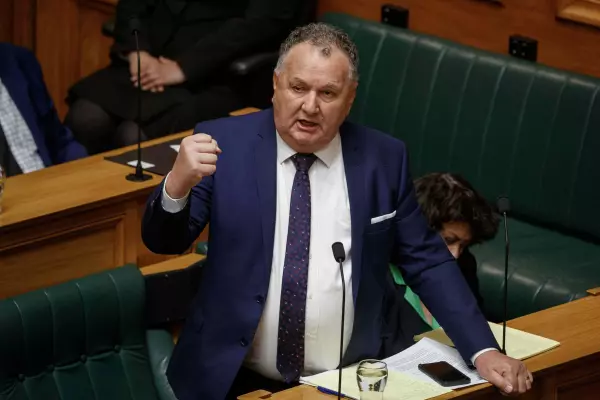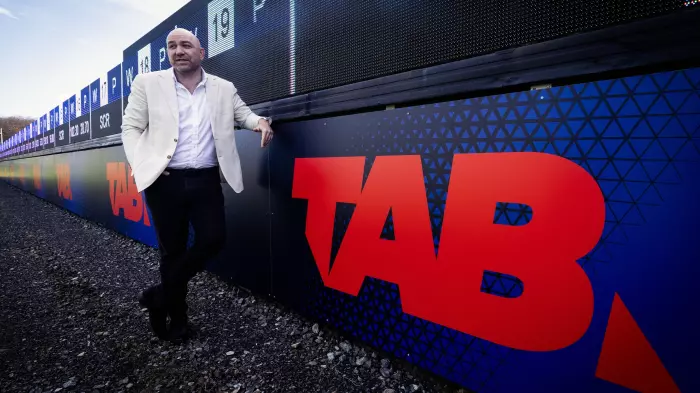OPINION: An alternative view on the crucifixion of Phil Twyford

Phil Twyford just can't win.
From the right to the left of the political spectrum, the hapless Transport, Urban Development, Economic Development and former Housing minister is assailed by critics who say it's time he was dumped from Cabinet altogether.
His string of travails has made him 'fair game' for Opposition politicians and journalists alike.
Tarnished by losing the KiwiBuild portfolio, and with a tendency to self-assurance that borders on arrogance and a bit of a habit of winging the details, Twyford is now at the centre of a cauldron of accusations relating both to the government's light rail ambitions in Auckland and the ill-fated Let's Get Wellington Moving initiative.
The two are getting tangled together, but should not be, beyond both sharing Twyford's inclination to over-promise and swiftly under-deliver. The issues are distinctively different in each case.
The Wellington issue is the result of bungled coalition politics, whereas the Auckland light rail issue is a classic case of bureaucratic patch protection by the New Zealand Transport Agency when faced with an unexpected bid for a project it regarded as its own.
First: Let's Get Wellington Moving. Yes, it's a mess.
Consistent with Wellington's failure for years to get its act together under the previous government, the Basin Reserve and Mt Victoria tunnel choke point remains at the heart of the political stalemate between motorists and the public transport lobby.
But in the current controversy, it is Twyford's associate transport minister Julie Anne Genter, who's created Twyford's headaches.
Her refusal to release a letter to Twyford that mixed party political and ministerial responsibilities by opposing a second Mt Victoria tunnel has been a gift to Opposition politicians and journalists alike. Nothing suggests 'guilty' like failing to front up, and nothing hammers home that impression like letting the issue drag on for weeks.
Yet Genter is more to blame for the death-by-a-thousand-cuts way the story has played out. It says a lot about Beehive bunker mentality that the Ombudsman's agreement to keep the letter secret while requiring Genter to write a letter explaining it can be interpreted as some sort of victory for the minister.
On Auckland light rail, things have become much more out of hand.
Some of the current commentary has suggested an entirely appropriate meeting between Twyford and the NZ Super Fund about the fund's alternative proposal for light rail was somehow illegitimate. In the process, the NZ Super Fund's good name is dragged through the mud, as if its desire to fund a multi-billion dollar asset for the country's largest city were some evil plot.
This is absurd.
Any organisation proposing to spend time, money, effort and its own credibility on such a huge, unexpected alternative to the existing plans would have rocks in its head if it didn't seek to brief ministers of its intentions. After all, if the ministers say 'forget it', then everyone can stop wasting their time right there and then.
From ministers' perspective, of course they should take the meeting. It's not as if the Super Fund is a subsidiary of Mossack Fonseca and they would be negligent not to examine a proposal that offers to free up billions of dollars of Crown capital by having someone else's money build the light rail scheme. There are any number of competing alternatives for government funding.
After that meeting, however, things got murky.
A narrative has gained legs that says NZTA examined the proposal and rejected its feasibility.
Recent leaked NZTA documents have sought to denigrate the Super Fund proposal as 'six Powerpoint slides'. That may have been what ministers saw at the initial briefing, but it's ridiculous to suggest that's where the fund's thinking began and ended.
Rather, NZTA's treatment of the Super Fund bid looks suspiciously like a case of officials circling the wagons to reject a proposal they didn't want.
Hence the competing versions of whether or not NZTA analysed the Super Fund bid in good faith and the leaked suggestion that the Super Fund's proposal has too few stops to meet Twyford's underlying ambition to use light rail as a catalyst for efficient urban intensification in Auckland.
An alternative view would be that the Super Fund is not stupid. Unlike a government, which can back all sorts of things without a bankable business case, it needs the passengers from such an intensified urban corridor for the project to stack up financially. It will presumably work to put up a plan that it believes would deliver those numbers. If they can't make those numbers, then NZTA will probably get the gig anyway.
The fact the new NZTA chair, Brian Roche, and Twyford are in unison in suggesting NZTA dropped the ball on the Super Fund proposal should be read as evidence the agency stonewalled rather than that Twyford has a yes-man on board or that this is all just some giant Twyford screw-up.
Yes. It is untidy, and Twyford has a knack for being in the midst of this government's most damaging untidiness. It doesn't help that he's bungled enough answers to parliamentary questions that he's damaged his personal credibility, but questions about what he did or didn't 'forget' when it came to recent board appointments are no more than political noise. The fact that he effectively sacked the old board speaks volumes about his dissatisfaction with their performance.
Twyford is at the heart of some of the government's most ambitious and difficult plans. He is simultaneously managing huge capital demands and battling a range of entrenched interests to effect major changes in policy and performance. It was never going to be easy. Nor is it obvious that all of those policies are well-founded. But they are the government's agenda.
If anything, his greatest personal failing mirrors that of the government as a whole - he's better at thinking policy up than at executing it. He's also not terribly humble about that fact.
But it's highly contestable to suggest that he should be falling on his sword in response to a campaign by a government agency to protect its own patch.
Comments












